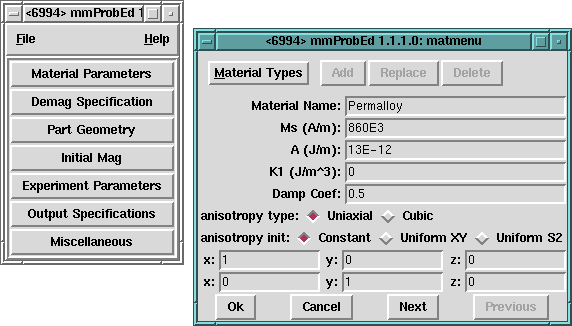


Overview
The application mmProbEd provides a
user interface for creating and editing micromagnetic problem
descriptions in the Micromagnetic Input Format
(MIF). mmProbEd also acts as
a server, supplying problem descriptions to running micromagnetic
solvers.
Launching
mmProbEd may be started either by selecting the
mmProbEd button on mmLaunch, or from the
command line via
tclsh oommf.tcl mmProbEd [standard options] [-net <0|1>]
Inputs
The menu selection File|Open... displays a dialog box
for selecting a file from which to load a MIF problem
description. Several example files are included in the
OOMMF release in the directory app/mmpe/examples.
At startup, mmProbEd loads the problem contained in
app/mmpe/init.mif as an initial problem. Note: When loading a
file, mmProbEd discards comments and records it does not
understand. Use the FileSource application to serve unmodified
problem descriptions.
Outputs
The menu selection File|Save as... displays a dialog box for
selecting/entering a file in which the problem description currently
held by mmProbEd is to be saved. Because the internal data format
use by mmProbEd is an unordered array that does not include
comments (or unrecognized records), the simple operation of reading in a
MIF file and then writing it back out may alter the file.
Each instance of mmProbEd contains exactly one problem description at a time. When the option -net 1 is active (the default), each also services requests from client applications (typically solvers) for the problem description it contains.
Controls
The main panel in the mmProbEd window contains buttons
corresponding to the sections in a MIF problem description.
Selecting a button brings up another window through which the contents
of that section of a problem description may be edited. The MIF sections and the elements they contain are described in detail in the
MIF documentation.
Only one editing window is displayed at a time. The windows may be
navigated in order using their Next or
Previous buttons.
PLEASE NOTE: The material parameter values provided for the symbolic material types of Iron, Nickel, etc. should not be taken as standard reference values for these materials. These values are only approximate. They are included for convenience, and as examples for users who wish to supply their own material types with symbolic names. To introduce additional material types, edit the file oommf/app/mmpe/materials, appending your new entries in the same format as the example materials.
The menu selection File|Exit terminates the mmProbEd application. The menu Help provides the usual help facilities.
